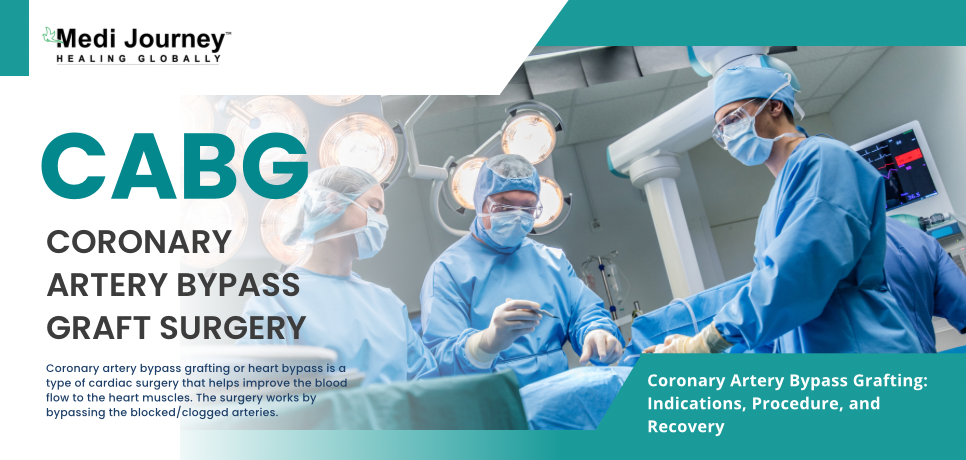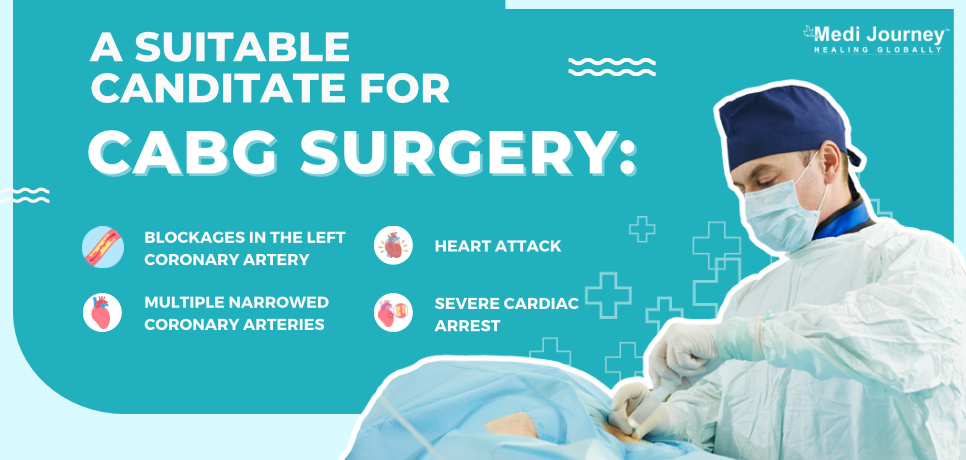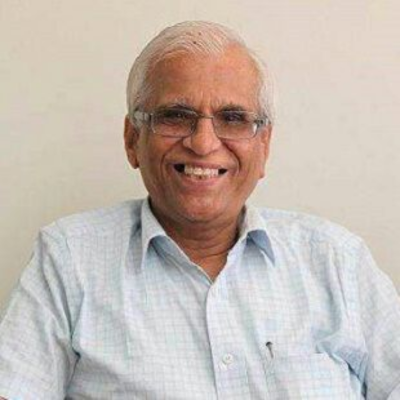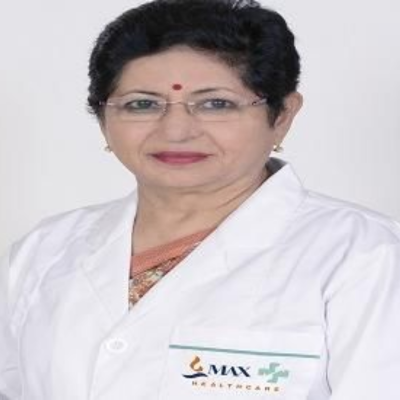PCOS and PCOD: Learn the Symptoms, Differences, and Treatment Options
 21 November,2024
Read More
21 November,2024
Read More
Enquire now in case of any assistance needed
 26 February,2024
26 February,2024

CABG, or coronary artery bypass grafting, is one of the most widely performed open heart surgery. The recent data shows that over 4,00,000 CABG procedures are done yearly. If you are suffering from blocked arteries that cannot be managed through dietary changes, medications, and angioplasty, you might have been recommended heart bypass surgery.
Robert Goetz performed the first heart bypass surgery in 1961. The procedure has seen significant improvements since then. Today, most cardiac surgeons opt for minimally invasive techniques rather than open heart surgery. It has the advantage of reducing the recovery time and the associated risks.
This blog aims to educate you on what CABG is, who requires it, what the procedure is, and recovery afterward.
Coronary artery bypass grafting or heart bypass is a type of cardiac surgery that helps improve the blood flow to the heart muscles. The surgery works by bypassing the blocked/clogged arteries. During CABG, the surgeon takes grafts from healthy blood vessels in the legs/forearm/chest. The graft helps in rerouting the blood flow by making a new pathway.
Depending on the number of blood vessels blocked, the surgeon will perform one of these procedure –
The risk of having severe cardiac issues such as heart failure and cardiac arrest depends on the number of arteries blocked. The time duration and complexity of the surgery also increase if there are multiple blocked arteries.
A cardiac surgeon specializing in vascular surgery performs CABG. It is a major procedure involving a team of skilled medical professionals. These include:

CABG is recommended for patients who have CAD (coronary artery disease). In CAD, the arteries carrying oxygenated blood to the heart muscles get blocked. Angioplasty and stenting are usually advised for treating narrowed arteries. However, if the patient is having multiple blockages, a heart bypass surgery is recommended.
A suitable candidate for CABG surgery is someone who has –
While CABG surgery is generally safe and effective, it carries inherent risks and potential complications, including:
Pre-existing conditions like kidney disease, chronic obstructive pulmonary disease, diabetes, etc., increase the chances of complications.
The recovery period following CABG surgery varies from patient to patient but typically involves the following stages:
Coronary Artery Bypass Grafting (CABG) surgery remains a mainstream treatment option for severe coronary artery disease. The surgery offers relief and an improved quality of life for lakhs of patients worldwide. While the procedure involves risks and challenges, advancements in surgical techniques and comprehensive perioperative care have significantly enhanced outcomes and reduced complications.
Doctor of Pharmacy
Dr. Deepanshu Siwach is a skilled clinical pharmacist with a Doctor of Pharmacy degree. He has 4+ years of experience and has worked with thousands of patients. He has been associated with some of the top hospitals, such as Artemis Gurgaon and Teerthanker
Chairman
Cardiac Electrophysiologist, Interventional Cardiologist
Dr. T. S. Kler is a Padma Bhushan recipient with over 48 years of experience as an Interventional Cardiologist and Electrophysiologist. He has performed over 35,000 angioplasties and is a pioneer in electrophysiology, having established the first department in India. ...
Senior Consultant
Medical Oncologist
Nanavati-Max Super Speciality Hospital, Mumbai
Book an Appointment Talk To ExpertSenior Director
Gynecologist and Obstetrician, IVF Specialist
Max Super Speciality Hospital, Shalimar Bagh, New Delhi
Book an Appointment Talk To ExpertSenior Director
Gynecologist and Obstetrician, IVF Specialist
Max Smart Super Speciality Hospital, Saket, New Delhi
Book an Appointment Talk To ExpertSenior Director
Gynecologist and Obstetrician
Max Smart Super Speciality Hospital, Saket, New Delhi
Book an Appointment Talk To ExpertSenior Director
Gynecologist and Obstetrician
Max Smart Super Speciality Hospital, Saket, New Delhi
Book an Appointment Talk To ExpertSenior Director
Gynecologist and Obstetrician
Max Smart Super Speciality Hospital, Saket, New Delhi
Book an Appointment Talk To ExpertFill up the form and get assured assitance within 24 hrs!
The Art of Effective Communication
 05 November,2024
Read More
05 November,2024
Read More
 29 October,2024
Read More
29 October,2024
Read More
 28 October,2024
Read More
28 October,2024
Read More
Trusted by Patients
"I am Asim from Bangladesh and was looking for treatment in India for neuro. I visited many websites to get the complete information regarding the treatment but I was not satisfied as I was getting confused. In the meanwhile, one of my friends suggested I seek help from Medi Journey as he experienced his medical journey very smoothly and was satisfied with it. They have filtered the top 10 doctors as per experience, the success rate of surgery & profile, so it helps us to choose the best treatment in India. "
"For my knee surgery, Medi Journey guided me to BLK Hospital where I received exceptional care. The team's support and the expertise at BLK Hospital exceeded my expectations. Thank you Medi Journey for making my medical journey stress-free. "
"I came from Iraq for my granddaughter's eye surgery in India facilitated by Medi Journey, due to critical cases they advised us to get a second opinion from the different hospitals before going to surgery. Finally, we went to Fortis Escort Hospital, which helped us to get more confidence for diagnosis. Fortis Escort Hospital has the best eye surgeon team with the latest instruments. Thanks to all team members for providing a high-quality treatment in India at an affordable cost. "
"I came for my hair transplant in India, before coming I was so confused about choosing the best clinic and surgeon for me. But thanks to God one of my friends had a hair transplant in India through Medi Journey. He recommended me to go with them. I am completely happy with my experience with them. They were always very fast in their responses to me. the success rate of my hair transplant surgery is 100%."
"Artemis Hospital, suggested by Medi Journey, turned out to be a great choice for my treatment. The personalized assistance and medical care were exceptional. I'm grateful to Medi Journey for guiding me to a hospital that perfectly matched my needs. Highly recommended! "
"I came from Afghanistan for my treatment in India at Jaypee Hospital, Noida. I had a fantastic experience with Medi Journey. Kudos to them for their incredible support during my medical journey. They not only took care of all the logistics but also connected me with a fantastic healthcare team. Efficient, caring, and highly recommended for a hassle-free medical tourism experience."
"I am Adam from Kano, Nigeria, one of my friends from Nigeria was facilitated by Medi Journey, and he recommended us to go with them. I sent my all reports to them and within 48 hours they reverted with 4 options from different hospitals. They helped me to get a Visa letter from the hospital, arrange pick-up from the airport, and book a hotel for me. Their team is very honest and throughout our stay in India they are with us they are caring for us like his family members. BLK Hospital is the best hospital in India with a top surgical oncologist surgeon team, a very advanced OT, and a Radiotherapy department. I wish more success to Medi Journey. "
"Great experience at the Max Hospital for my spine surgery and was successfully done. I thank my neurosurgeon and his entire team. I recommended all of my country's people to Medi Journey for treatment in India, they choose the best hospital, the best doctors, and the best cost for patients."
"I came to India from Dhaka, Bangladesh for my father-in-law's cardiac surgery at Fortis Hospital. I was confused about choosing the best surgeon for him before coming, but their team helped me to choose the best hospital and best cardiac surgeon in India with very good cost and 100% success rate of surgery. I am very happy with the services, really they make my journey so comfortable that make me feel at home. Thanks again and I like people to choose "Medi Journey" as your travel guide. "
"I am Mohammad from Bangladesh came to India for my general health checkup. Medi Journey offers me the complete package including Pick-up from the airport, hotel services, and 24-hour assistance. They guide you to choose the best hospital in India, the best cost of treatment with top-most doctors and give you complete information about hotel booking, and pick-up from the airport before coming to India They have the best team to help. Always choose Medi Journey for your treatment in India."





